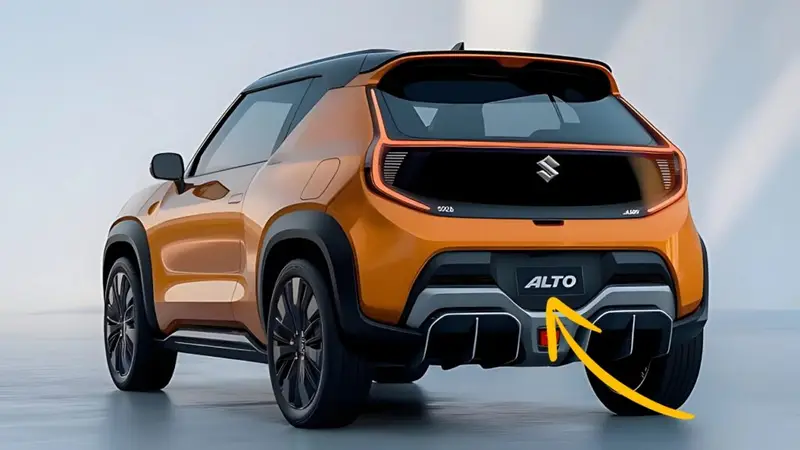New Maruti Alto EV: Electric cars are becoming more popular, and Maruti Suzuki, India’s favorite carmaker, is ready to join the trend with the Maruti Alto EV. Known for its budget-friendly and reliable cars, Maruti is now working on an electric version of the Alto—one of India’s best-selling cars. In this article, we’ll explore what the Alto EV might offer, its expected features, and why it could be a great choice for everyday drivers.
What is the Maruti Alto EV?
The Alto EV will be an electric version of the popular Maruti Alto. Since the regular Alto is known for being affordable, fuel-efficient, and easy to drive, the electric version is expected to keep these qualities while offering the benefits of an EV—lower running costs and zero emissions.
Maruti has not yet revealed all the details, but we can make some smart guesses based on the company’s plans and the growing EV market in India.
Expected Features of the Maruti Alto EV
Here’s what we think the Alto EV might include:
1. Battery and Range
The Alto EV will likely have a small to medium-sized battery, perfect for city driving. It may offer a range of around 150-200 km on a single charge, which is enough for daily commutes.
2. Charging Time
Since it’s designed for budget-conscious buyers, the Alto EV will probably support regular home charging (AC charging), taking about 6-8 hours for a full charge. Fast charging options might also be available, reducing charging time to 1-2 hours.
3. Performance
Electric cars are known for smooth and quiet rides. The Alto EV will likely have a small electric motor with enough power for city speeds (around 60-80 km/h comfortably). Don’t expect super-fast acceleration, but it should be perfect for stop-and-go traffic.
4. Design and Interior
The exterior may look similar to the regular Alto but with some EV-specific changes like a closed-off grille and blue accents. Inside, it could feature a simple dashboard, basic infotainment, and comfortable seating for four.
5. Price
Maruti is known for affordability, so the Alto EV might be priced between ₹5-7 lakh (ex-showroom), making it one of the cheapest electric cars in India.
Maruti Alto EV vs. Other Small EVs
Let’s compare the expected specs of the Alto EV with some other small electric cars in India:
| Feature | Maruti Alto EV (Expected) | Tata Tiago EV | Citroen eC3 |
|---|---|---|---|
| Range | 150-200 km | 250-315 km | 320 km |
| Battery | ~15-20 kWh | 19.2-26 kWh | 29.2 kWh |
| Charging Time | 6-8 hours (AC) | 8-9 hours (AC) | 10 hours (AC) |
| Price (approx.) | ₹5-7 lakh | ₹8-12 lakh | ₹11-13 lakh |
As you can see, the Alto EV will likely be the most affordable option, though with a shorter range compared to rivals.
Why Should You Consider the Maruti Alto EV?
1. Low Running Cost
Electric cars are much cheaper to run than petrol cars. Charging the Alto EV at home could cost ₹2-3 per km, while petrol Alto costs around ₹4-5 per km.
2. Low Maintenance
EVs have fewer moving parts, meaning less maintenance—no oil changes, fewer engine repairs, and longer-lasting brakes.
3. Eco-Friendly
Zero tailpipe emissions mean you’re helping reduce air pollution, especially in crowded cities.
4. Perfect for City Driving
With a small size and easy handling, the Alto EV will be great for narrow roads and heavy traffic.
FAQs About the Maruti Alto EV
When will the Maruti Alto EV launch?
Maruti has not confirmed the exact date, but it is expected by 2025 or 2026.
What will be the top speed of the Alto EV?
It will likely be limited to around 80-100 km/h, ideal for city use.
Will it have fast charging?
Possibly, but the main focus will be on home charging for cost savings.
Is the Alto EV good for long trips?
No, its range is best suited for daily city commutes, not highways.
How much will it cost to charge the Alto EV?
A full charge at home may cost around ₹150-200, depending on electricity rates.
Final Thoughts
The Maruti Alto EV could be a game-changer for budget-conscious buyers looking to switch to electric. With its affordable price, low running costs, and trusted Maruti reliability, it might become the go-to EV for city commuters. While it won’t be a high-performance car, it will do exactly what it’s meant to—provide a simple, efficient, and eco-friendly ride for everyday use.



